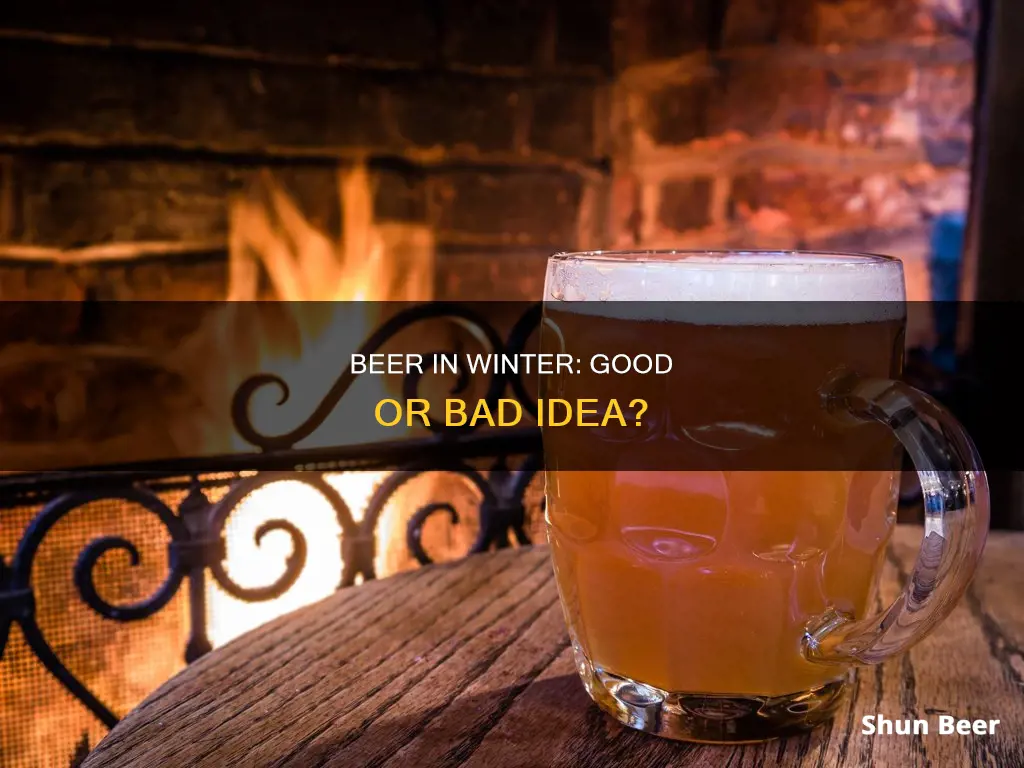
Beer is a popular alcoholic beverage, and its consumption is often associated with warm and sunny days. However, as the temperature drops and winter sets in, many people wonder if it is suitable to continue enjoying their favourite brew. The answer is yes, beer can be enjoyed during the colder months, and there are even specific beer cocktails and winter-themed beers to explore. From rich, high-alcohol beers to dark stouts and porters, the right beer can provide a warming sensation and a delightful drinking experience during the chilly season.
What You'll Learn
- Beer can be enjoyed in winter, but it is important to be aware of the risks of drinking alcohol in cold weather
- Dark beers are typically more popular in the winter
- Beer is a versatile drink that can be enjoyed with a range of foods
- Alcohol can give a false sense of warmth, so it is important to dress warmly when drinking in winter
- Drinking beer in winter can be dangerous for people with heart problems

Beer can be enjoyed in winter, but it is important to be aware of the risks of drinking alcohol in cold weather
When choosing a beer for winter, opt for dark beers like stouts, porters, or dobbelbock. These beers have big, bold flavours that are worth savoring slowly, and they tend to taste good whether they are cold or warm. You can even take your stout beer out of the fridge and let it warm in your hands as you drink. Another option is to go for rich, high-alcohol beers. The higher alcohol content will give you that warmer feel, and the stronger flavour will encourage you to sip it slowly.
Beer can also be used as a cocktail ingredient in the winter months. Beer cocktails can be topped with beer for some extra fizz, or the beer can be cooked down into a syrup or turned into bitters. Beer is a versatile ingredient that can be paired with various spices, fruits, and vegetables to create seasonal drinks.
However, it is important to remember that drinking alcohol in cold weather can be dangerous. Alcohol can give you a false sense of warmth, increasing your risk of hypothermia. It pulls heat away from your body's core, vital organs, and brain, causing your body temperature to drop. Alcohol also dehydrates you, which can further increase your risk of hypothermia. Therefore, if you choose to drink beer in the winter, it is important to take some safety precautions. Eat fatty or high-carb foods before drinking, avoid beverages that are too cold, alternate alcoholic and non-alcoholic drinks, and wear warm clothing.
Beer and Steroids: Mixing Alcohol with Performance-Enhancing Drugs
You may want to see also

Dark beers are typically more popular in the winter
The darkness of dark beers comes from the malt, which gives them their flavour, aroma, and colour. Malt is barley that has been germinated and kilned. Different malts are made depending on how hot the barley is kilned and in what way. For dark beers, the malt is kilned at a hotter temperature, sometimes to the point of roasting.
Dark beers can range from light-bodied to rich and creamy, and from sweet to bitter. They can be as sweet as milk chocolate or as bitter as burnt coffee. Some popular styles of dark beer include stouts, porters, and black IPAs. Stouts are dark, bitter, and roasty-flavoured, and are black in colour. They taste like coffee, licorice, and chocolate, and are perfect for sipping on a cold winter night. Porters are deep brown or reddish with a creamy head and a roasty chocolate flavour. They are slightly bitter and are one of the heaviest styles of beer, making them ideal for drinking during the colder months. Black IPAs are IPAs that use dark specialty malts to turn the beer inky black. They are well-balanced, with strong, bright hops offsetting the rich and toasted notes from the malt.
Some specific examples of dark beers that are perfect for winter include Keegan's Mother's Milk Stout, a sweet stout with a light sweetness that is lovely with dessert; Sumi Zest, an imperial stout with notes of orange zest and vanilla; and Doug, a black IPA with a bit of citrus from the hops, a nice malty backbone, and a lovely chocolatey sweetness.
Beer and Smirnoff: A Match Made in Heaven?
You may want to see also

Beer is a versatile drink that can be enjoyed with a range of foods
Firstly, contrast is essential. Aim for a beer or dish with a dominant flavour, such as sweet, rich, or oily. For instance, oysters and stout make a great pairing because the briny flavour of oysters can stand up to the rich, chocolatey notes of the stout.
Secondly, complementing flavours is a simple way to create a delicious pairing. Match rich foods with heavy and flavourful beers, like stouts or porters. Conversely, light and refreshing beers, such as wheat beers or lagers, pair well with salads, fish, and fruity desserts.
Thirdly, beer can serve as a palate cleanser, making it ideal for cutting through the heat of spicy dishes or the richness of fried foods. A crisp, light beer can provide a refreshing contrast to these bold flavours.
Lastly, it's important to avoid overpowering flavours. Medium and dark beers, with their rich and powerful tastes, can easily overwhelm certain dishes. For example, the flavour of a strong beer like Guinness would likely overpower the more subtle taste of salmon.
When it comes to specific beer styles, here are some general food pairing ideas:
- Light lagers: Spicy food, burgers, salads
- Wheat beers: Spicy food, fruity desserts
- India Pale Ales (IPAs): Steak, barbecue, Mexican food
- Amber ales: Pizza, fried food, smoked pork
- Dark lagers: Pizza, burgers, hearty stews
- Brown ales: Sausage, sushi, fish
- Porters: Seafood, coffee-flavoured desserts, game meats
- Stouts: Chocolate desserts, shellfish, Mexican food
These are just a few examples, and there's plenty of room for creativity in crafting unique beer and food pairings. Understanding the flavour profiles of different beers is key to making successful matches.
Beer and Sinus Congestion: Is There a Link?
You may want to see also

Alcohol can give a false sense of warmth, so it is important to dress warmly when drinking in winter
Drinking beer in winter is a common practice, and some people even believe in the therapeutic effects of drinking warm beer during the cold season. However, it is important to be aware of the potential risks associated with consuming alcohol in cold environments.
Alcohol can give you a false sense of warmth. When you drink alcohol, your blood vessels dilate, sending warm blood to your skin and creating a sensation of warmth. This is because the blood rushing to your skin is pulled away from your core, where it is needed to keep your vital organs warm. As a result, your body temperature drops, and you become more susceptible to the cold. This mechanism can increase your risk of hypothermia, especially if you are spending long periods outdoors or walking long distances in the cold.
To stay safe while drinking in winter, it is crucial to dress warmly and in layers. Wearing warm clothing helps insulate your body and retain heat, counteracting the loss of body heat caused by alcohol consumption. It is also important to be mindful of other factors that can affect your body temperature, such as the amount of alcohol consumed, personal tolerance, and overall health.
Additionally, alcohol can dehydrate you, further increasing your risk of hypothermia. Alcohol is a diuretic, which means it increases the frequency of urination, leading to faster dehydration. This can be particularly dangerous in cold weather, as you may not feel as thirsty, but your body still requires adequate hydration to regulate its temperature effectively. Therefore, it is essential to prioritize hydration by drinking non-alcoholic beverages alongside any alcoholic drinks.
In conclusion, while drinking beer in winter may be enjoyable for some, it is crucial to be aware of the false sense of warmth that alcohol can create. By dressing warmly, staying mindful of alcohol consumption, and prioritizing hydration, you can help keep yourself safe and warm during winter activities. Remember, moderation is key, and being cautious can help you stay out of harm's way.
Beer Tastes Better After a Good Workout: Why?
You may want to see also

Drinking beer in winter can be dangerous for people with heart problems
While drinking beer in winter is a matter of personal preference, it is important to be aware of the potential health risks associated with alcohol consumption, especially for individuals with heart problems.
Excessive alcohol intake can have detrimental effects on heart health, and this risk is heightened during the winter months when the body is already working harder to maintain a stable temperature. Alcohol can cause heat loss, as the carbon dioxide produced when beer is drunk is discharged into the air, taking heat with it. This can place additional strain on the body, particularly the heart, which is already working to keep the body warm.
For individuals with heart problems, drinking beer in winter can be especially dangerous. Heart conditions such as cardiomyopathy, which is caused by long-term heavy alcohol use, can lead to severe consequences, including heart failure. Cardiomyopathy occurs when the heart changes shape due to stretching and enlargement, weakening the heart muscle and reducing its pumping efficiency. This results in a decreased oxygen supply to the body. The risk of developing cardiomyopathy is higher in individuals with alcohol use disorders or genetic mutations that cause slower alcohol processing.
Additionally, heavy drinking can lead to high blood pressure, heart failure, stroke, and other cardiovascular issues. It can also contribute to obesity and associated health problems. Even moderate drinking, defined as one drink per day for women and one to two drinks for men, may be harmful to those with certain heart rhythm abnormalities or heart failure.
It is important to note that the temperature at which beer is consumed can also affect the body's response. Warmer beer, typically consumed in winter, may have a more pronounced effect on body temperature and heart rate. Therefore, individuals with heart problems should exercise caution when drinking beer in winter, as it may exacerbate existing conditions or increase the risk of developing heart-related complications.
In conclusion, while drinking beer in winter may be a enjoyable for some, it is important to prioritize health, especially for those with heart problems. The potential risks associated with alcohol consumption, including heat loss and cardiovascular strain, can be dangerous for individuals with pre-existing heart conditions. As such, it is advisable for those with heart problems to consult with their healthcare providers about safe drinking habits and to prioritize alternative methods of warming the body during the winter months.
Beer's Power: Removing Trapped Gas, Always
You may want to see also
Frequently asked questions
Yes, you can drink beer in the winter. In fact, beer is a popular winter drink, especially in places with very cold climates.
People may reach for beer in the winter because of its sweet, bitter, and nutty flavours, which can bring a feeling of warmth to the body.
Beer is a great companion to rich, heavy, and calorie-dense winter foods. For example, a glass of dark beer pairs well with a common winter dish like roasted pork.
Yes, drinking alcohol in cold weather can lower your core body temperature, making you more susceptible to hypothermia. It can also reduce your body's ability to shiver, another way your body keeps warm in cold temperatures.







